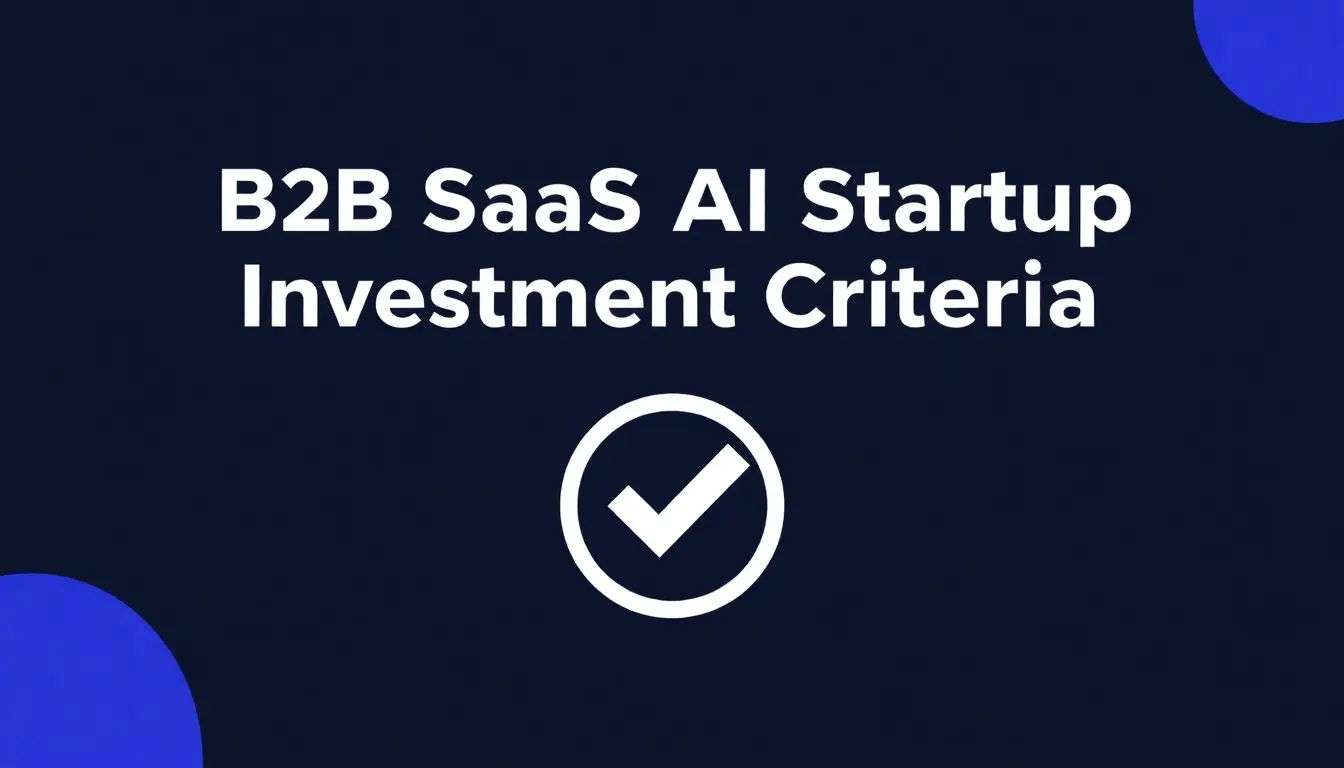B2B SaaS AI Startup Investment Criteria
B2B SaaS AI startups are companies that create software solutions powered by artificial intelligence (AI) for other businesses. These startups are popular with investors because they have the potential to grow quickly and transform entire industries. However, investing in them can be risky. To make smart decisions, investors use specific standards, known as investment criteria, to evaluate which startups are worth funding. This blog post explains the key B2B SaaS AI startup investment criteria and offers practical advice for founders looking to attract investors. It’s also helpful for investors who want to understand what makes a startup a good bet.
Why Investment Criteria Matter
Investors need a clear way to pick startups with the best chance of success. B2B SaaS AI startup investment criteria help them assess whether a company has a strong plan, a capable team, and a large enough market to grow. For founders, understanding these criteria can guide them in building a business that appeals to investors.
Here are the main criteria investors focus on:
-
Market Size and Potential
-
Team Expertise and Experience
-
Product Uniqueness and Innovation
-
Traction and Customer Validation
-
Scalability and Growth Potential
-
Financial Projections and Revenue Model
-
Competitive Landscape and Differentiation
-
Exit Strategy and Potential Returns
Let’s break down each of these criteria and explain how startups can meet them.
1. Market Size and Potential
When investors evaluate B2B SaaS AI startup investment criteria, they start with market size and potential. They want to know if the startup is targeting a large enough market to generate significant revenue and growth. A big market means more customers and better opportunities for high returns.
To demonstrate this, startups use three key metrics:
-
Total Addressable Market (TAM): The total revenue opportunity if the startup captured 100% of the market.
-
Serviceable Addressable Market (SAM): The portion of the TAM that the startup can realistically target with its product.
-
Serviceable Obtainable Market (SOM): The share of the SAM the startup can capture in the near term.
For example, consider a startup that offers an AI-powered tool for automating payroll. The TAM might be the entire global payroll software market, worth billions of dollars. The SAM could be businesses that are open to adopting AI solutions, and the SOM might be small-to-medium enterprises (SMEs) in a specific region that the startup can reach initially.
Startups should back up these numbers with data from reliable sources, such as industry reports or market research. For instance, a report might show that the AI software market is growing at 40% annually, indicating strong future demand. Additionally, startups need to explain why their product fits the market. If businesses are struggling with slow, manual payroll systems, an AI tool that automates and speeds up the process addresses a clear need.
Tips for Startups
-
Use up-to-date statistics from trusted sources to support your market size estimates.
-
Focus on a specific customer segment to make your SOM more realistic.
-
Highlight trends, such as increasing AI adoption, to show growth potential.
A startup that can demonstrate a large, growing market with a clear need for its product will stand out to investors. Market size is a foundational part of B2B SaaS AI startup investment criteria.
2. Team Expertise and Experience
Investors know that even the best ideas need a strong team to succeed. That’s why the team’s expertise and experience are critical B2B SaaS AI startup investment criteria. A capable team can navigate challenges, adapt to changes, and execute the business plan effectively.
Investors look for teams with a mix of skills, including:
-
Technical expertise: Proficiency in AI, machine learning, and software development.
-
Business acumen: Experience in sales, marketing, and operations.
-
Industry knowledge: Understanding of the target market and customer pain points.
For example, a startup building an AI platform for healthcare might have a founding team that includes a data scientist with AI experience, a software engineer, and a healthcare professional with industry insights. This combination shows investors that the team can both build the product and understand the market.
Startups should highlight their team’s strengths in pitches by sharing relevant experience, past successes, and any unique skills that set them apart. If the team has previously worked at well-known companies or has a track record of successful projects, this can boost credibility.
Tips for Startups
-
Showcase a balanced team with both technical and business skills.
-
Include any relevant achievements, such as patents, awards, or successful exits.
-
If the team lacks experience in certain areas, consider bringing on advisors or hiring key personnel.
A strong team is often the deciding factor for investors, as it reduces the risk of failure. Demonstrating that your team has the right expertise is essential for meeting B2B SaaS AI startup investment criteria.
3. Product Uniqueness and Innovation
In a crowded market, having a unique and innovative product is crucial. Investors want to see that a startup’s solution stands out and offers something new or better than existing options. This is a key part of B2B SaaS AI startup investment criteria because it shows potential for market disruption and customer adoption.
For B2B SaaS AI startups, innovation often comes from how they use AI to solve problems. This could be through:
-
New applications of AI: Using AI in ways that haven’t been done before, such as predictive analytics for supply chain management.
-
Improved efficiency: Offering faster, more accurate solutions than traditional software.
-
Proprietary technology: Developing unique algorithms or models that competitors can’t easily replicate.
Startups can demonstrate their product’s uniqueness through demos, prototypes, or customer testimonials. If the product has intellectual property protection, such as patents, this can further strengthen the case.
For example, a startup might create an AI tool that automates contract analysis for legal teams, reducing review time by 80%. If no other tool offers this level of automation, it’s a strong selling point.
Tips for Startups
-
Clearly define your product’s unique value proposition (UVP).
-
Use customer feedback or pilot programs to validate the innovation.
-
If possible, secure intellectual property rights to protect your technology.
Investors are more likely to fund startups that bring something fresh to the market. Showing that your product is innovative and hard to copy is vital for meeting B2B SaaS AI startup investment criteria.
4. Traction and Customer Validation
Traction proves that people want your product. It’s one of the most important B2B SaaS AI startup investment criteria because it reduces risk for investors. Traction can be shown through metrics like user growth, revenue, customer retention, or partnerships.
For early-stage startups, even small signs of traction can be powerful. This might include:
-
Pilot programs: Agreements with companies to test the product.
-
Early adopters: A handful of paying customers or users.
-
Waitlists: Potential customers who have expressed interest.
As the startup grows, investors expect more concrete metrics, such as:
-
Monthly Recurring Revenue (MRR): Steady income from subscriptions.
-
Customer Acquisition Cost (CAC) and Lifetime Value (LTV): Indicators of profitability.
-
Churn rate: How many customers stop using the product over time.
Customer validation, such as testimonials or case studies, also adds credibility. For instance, if a well-known company uses your AI tool and reports significant cost savings, it’s a strong endorsement.
Tips for Startups
-
Start tracking key metrics early, even if the numbers are small.
-
Use customer feedback to improve the product and build case studies.
-
Focus on acquiring a few high-quality customers rather than chasing vanity metrics.
Traction shows that your startup is on the right path. By presenting clear evidence of customer interest and growth, you can meet this critical part of B2B SaaS AI startup investment criteria.
5. Scalability and Growth Potential
Scalability is the ability to grow rapidly without a corresponding increase in costs. For B2B SaaS AI startups, scalability is essential because it allows the business to expand quickly and serve more customers efficiently. Investors prioritize scalability as part of B2B SaaS AI startup investment criteria because it directly impacts future profits.
Several factors contribute to scalability:
-
Cloud infrastructure: Allows the product to handle more users without major upgrades.
-
Automation: Reduces the need for manual processes as the business grows.
-
Self-service features: Enable customers to sign up and use the product with minimal support.
Startups should also project future growth by outlining plans to enter new markets, add features, or target different customer segments. For example, a startup might start by serving SMEs in one region and plan to expand to larger enterprises globally.
Tips for Startups
-
Build your product with scalability in mind from the beginning.
-
Use automation tools to streamline operations and reduce manual work.
-
Create a clear growth plan that shows how you’ll scale over time.
Investors want to see that your startup can grow quickly and efficiently. Demonstrating scalability is key to meeting B2B SaaS AI startup investment criteria.
6. Financial Projections and Revenue Model
Investors need to understand how your startup will make money and become profitable. Financial projections and a clear revenue model are essential B2B SaaS AI startup investment criteria. They show that you’ve thought through the business side and have a plan for sustainability.
Key financial metrics include:
-
Revenue forecasts: Expected income over the next 3-5 years.
-
Profit margins: How much money you’ll keep after expenses.
-
Burn rate: How quickly you’re spending cash before becoming profitable.
For B2B SaaS AI startups, common revenue models are:
-
Subscription-based: Customers pay a recurring fee (monthly or annually).
-
Usage-based: Customers pay based on how much they use the product.
-
Freemium: A free version with paid upgrades for advanced features.
Startups should base their projections on realistic assumptions, such as customer acquisition rates and pricing strategies. For example, if similar startups acquire 100 customers in their first year, using that as a benchmark can make your projections more credible.
Tips for Startups
-
Be conservative with your financial estimates to avoid overpromising.
-
Clearly explain your revenue model and why it’s suitable for your market.
-
Include a break-even analysis to show when you’ll become profitable.
Solid financial planning reassures investors that your startup is a sound investment. Meeting this criterion is crucial for attracting funding.
7. Competitive Landscape and Differentiation
Understanding the competitive landscape is vital for any startup. Investors want to know who your competitors are and how your product is different. This is a key part of B2B SaaS AI startup investment criteria because it shows that you can capture market share.
Startups should conduct a thorough competitive analysis by:
-
Identifying direct and indirect competitors.
-
Analyzing their strengths and weaknesses.
-
Highlighting what makes your product better or different.
Differentiation can come from various factors, such as:
-
Superior technology: More advanced AI capabilities.
-
Better pricing: Offering more value for the same price.
-
Exceptional customer service: Providing faster support or personalized onboarding.
For example, if competitors offer AI tools with limited customization, your startup could differentiate by allowing users to tailor the AI to their specific needs.
Tips for Startups
-
Create a simple competitor comparison chart to visualize differences.
-
Focus on one or two key differentiators rather than trying to be better at everything.
-
Monitor competitors regularly to stay ahead of market changes.
By showing that you understand the competition and have a clear strategy to stand out, you can meet this important investment criterion.
8. Exit Strategy and Potential Returns
Investors want to know how they’ll get their money back—and with a profit. That’s why an exit strategy is a critical part of B2B SaaS AI startup investment criteria. An exit strategy outlines how investors can cash out, typically through an acquisition or an initial public offering (IPO).
Startups should:
-
Research recent exits in their industry to show potential outcomes.
-
Identify potential acquirers, such as larger tech companies looking to expand their AI capabilities.
-
Estimate potential returns based on market trends and comparable exits.
For example, if similar B2B SaaS AI startups have been acquired for 10x their annual revenue, you can use that multiple to project potential returns for investors.
Tips for Startups
-
Be realistic about exit timelines; most exits take 5-10 years.
-
Show that you’re building a business that would be attractive to acquirers.
-
Include exit strategy discussions in your pitch to demonstrate long-term thinking.
A clear exit strategy reassures investors that they can achieve a return on their investment. It’s an essential criterion for funding.
Tips and Best Practices
To increase your chances of meeting B2B SaaS AI startup investment criteria, avoid these common mistakes:
-
Overestimating market size: Be realistic and use data to back up your claims.
-
Ignoring competitors: Acknowledge the competition and explain how you’re different.
-
Lacking traction: Even early-stage startups should show some form of customer interest.
Here are some actionable tips for founders:
-
Talk to customers early: Validate your idea before building the product.
-
Test your product quickly: Launch a minimum viable product (MVP) to gather feedback.
-
Focus on key metrics: Track and improve metrics that matter to investors, like MRR and churn.
Investors often prioritize startups that show a deep understanding of their market, a clear path to growth, and a strong team. As one venture capitalist put it, “We invest in teams that can execute, not just ideas.”
Conclusion
Meeting B2B SaaS AI startup investment criteria is essential for attracting funding and building a successful business. By focusing on market size, team expertise, product innovation, traction, scalability, financial planning, competitive differentiation, and exit strategies, founders can position their startups as attractive investment opportunities.
For founders, the key is to build a solid foundation in each of these areas and present them clearly to investors. For investors, understanding these criteria helps identify startups with the highest potential for success.
If you’re a founder looking to raise capital or an investor seeking to evaluate B2B SaaS AI startups, focusing on these criteria will guide you toward better decisions. For more insights or personalized advice, feel free to reach out or explore additional resources on startup funding.







